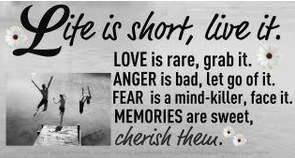Give these bits of wisdom a try and watch what happens. Imagine starting or ending each day with gratitude, self-validation and self-esteem elevating thoughts. Positive self-talk is a very powerful mechanism for improvement of mood, resilience and stress management. Self-talk is the talking you do in your own head about yourself and the things that happen, your own “running commentary” on your life. Often this self-talk happens so automatically that you are barely aware of it. However, what you say to yourself can have a big effect on the way that you feel, and on what you can achieve. Your self talk can be like an internal coach, encouraging you, boosting your confidence, believing in you, and motivating you to achieve your goals, or it can be like an internal bully, undermining you, criticizing you and beating up on you when you’re down. Negative thoughts, pessimism, fear, anxiety and doubt erode confidence. Be mindful of your inner dialogue to enhance optimism, self-worth or take you down. Cognitive Behavioral Therapy (CBT) actually helps you build a new circuit in your brain creating and connecting neurons that promote well-being.
These are some of the basic CBT techniques:
· Thought-stopping. Some people use sheer force of will, some visualize a red light or stop sign. Whatever you use, shut that thought down.
· Questioning. When you hear negative self-talk, wait. Ask yourself: What’s the evidence for what your mind is saying to you? What’s the proof?
· Reducing your anxiety. Depending on whether you’re on or off the bike, use whatever you find soothing (and legal): breathing, meditation, imagery, music, being in nature, talking with a friend. You may not become relaxed, but you’re likely to become more relaxed, perhaps just enough to allow another technique to work.
· Thought-replacement. Here’s your counterattack. What could you say (instead) to yourself that would be encouraging, supportive or motivating, while still believable?
– Positive, reality-based counter statements: (“Given my stage of training, I am climbing well.”)
– Affirmations. (“I am strong and have a good team in this race.”)
– Frequently-used cue words with positive associations. (“Calm and focused”)
– Behaviors. (“I’m going to focus on having good form on this climb.”)
– Positive, reality-based counter statements: (“Given my stage of training, I am climbing well.”)
– Affirmations. (“I am strong and have a good team in this race.”)
– Frequently-used cue words with positive associations. (“Calm and focused”)
– Behaviors. (“I’m going to focus on having good form on this climb.”)
· Mental Rehearsal. Create imagery in your mind’s eye to visualize success.




